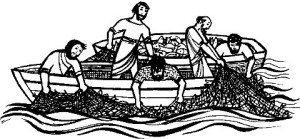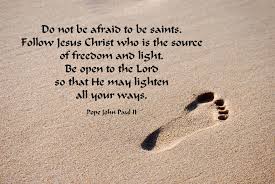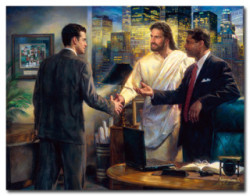
– 10th February 2022 –

Gospel reading: Luke 5:1-11
vs.1 Jesus was standing one day by the Lake of Gennesaret, with the crowd pressing round him listening to the word of God,
vs.2 when he caught sight of two boats close to the bank. The fishermen had gone out of them and were washing their nets.
vs.3 He got into one of the boats – it was Simon’s – and asked him to put out a little from the shore. Then he sat down and taught the crowds from the boat.
vs.4 When he had finished speaking he said to Simon,
“Put out into the deep water and pay out your nets for a catch.”
vs.5 Master,” Simon replied “we worked hard all night long and caught nothing, but if you say so, I will pay out the nets.”
vs.6 And when they had done this they netted such a huge number of fish that their nets began to tear,
vs.7 so they signaled to their companions in the other boat to come and help them; when they came, the filled the two boats to sinking point.
 vs.8 When Simon Peter saw this he fell at the knees of Jesus saying, “Leave me, Lord; I am a sinful man.”
vs.8 When Simon Peter saw this he fell at the knees of Jesus saying, “Leave me, Lord; I am a sinful man.”
vs.9For he and all his companions were completely overcome by the catch they had made;
vs.10 so also were James and John, sons of Zebedee, who were Simon’s partners.
But Jesus said to Simon, “Do not be afraid; from now on it is men you will catch.”
vs.11 Then, bringing their boats back to land, they left everything and followed him.
**************************************************
We have four commentators available from whom you may wish to choose .
Michel DeVerteuil : A Trinidadian Holy Ghost Priest, director of the Centre of Biblical renewal .
Thomas O’Loughlin: Professor of Historical Theology, University of Wales, Lampeter.
Sean Goan: Studied scripture in Rome, Jerusalem and Chicago and teaches at Blackrock College and works with Le Chéile
Donal Neary SJ: Editor of The Sacred Heart Messenger and National Director of The Apostleship of Prayer.
****************************************
Michel DeVerteuil
Lectio Divina with the Sunday Gospels
www.columba.ie
General comments
*******************************************************
General comments
The miraculous catch of fish was a historical event in the life of Jesus, but also a symbol of the deep conversion experiences which God grants us from time to time and which set us on a new course in our lives. These experiences usually occur at times when we feel we are stagnating – as spouses, parents, friends, church leaders, ministers, or managers in the work place. We are toiling all night and catching nothing.
Then one day God sends Jesus to us and he tells us to “put out into deep water” – to move in a new, and frightening, direction. The message might come from a person or a sermon, a book, a television program, a news item in the papers. Sometimes Jesus speaks to us from a negative experience – failure, rejection, falling into a sin we thought we would never commit, recognition that we are addicted to drugs or drink or power.
 We each have our deep water we must put out into: be reconciled with someone we have refused to speak to for years; give up devotions we love and move to a more contemplative prayer; start working among the poor; get involved in community development; go back to school; join AA; do a Marriage Encounter weekend or a Life in the Spirit seminar. We put out objections like St Peter’s: “we have toiled all night,” “what will happen if…,” “we tried this before and it didn’t work,” and so on. But we do it anyway and it works – relationships take on new life, classes or work-places become places of inspiration, our prayer life takes off – so much so that our problem now becomes how to cope with all we have to do: our nets begin to tear.
We each have our deep water we must put out into: be reconciled with someone we have refused to speak to for years; give up devotions we love and move to a more contemplative prayer; start working among the poor; get involved in community development; go back to school; join AA; do a Marriage Encounter weekend or a Life in the Spirit seminar. We put out objections like St Peter’s: “we have toiled all night,” “what will happen if…,” “we tried this before and it didn’t work,” and so on. But we do it anyway and it works – relationships take on new life, classes or work-places become places of inspiration, our prayer life takes off – so much so that our problem now becomes how to cope with all we have to do: our nets begin to tear.
We feel overwhelmed: “Leave me Lord, I am a sinner.” We who were totally bored now have a feeling of awe at the privilege of being spouse, parent, teacher in classroom or parish, or just to be a baptised Christian.
We know then that our lives can never be the same again: “from now on it is men you will catch.” This must be interpreted correctly. God does not want us to go round trying to “catch” people.
The text means first getting involved with people not things, and secondly (according to the parable in Matthew 13:47 – 50) that our mission in life is to lead one another into God’s net, so that we can all be gathered into his kingdom. The Lord wants us from now on to care for people, help them to grow in self-esteem, move away from addictions, from abusive marriages – all the different ways in which we need to be brought closer to God and feel safe in his net.
This new consciousness means giving up things that we thought important. We do it cheerfully; we are “not afraid” as we bring our boats back to land and without giving them a second thought, leave them there to follow the new way God has called us to.
Scriptural Prayer Reflection
Lord, we remember the day when your son Jesus found us washing our nets,
discouraged since we were toiling all night and catching nothing.
He said to us, “Put out into deep water,”
and because he said so, we paid out our nets there.
We netted such a huge quantity of fish that our nets began to tear
so that we signaled to companions in other boats to come and help us
and even theirs were filled to sinking point.
We were completely overcome at the catch we made
and we fell on our knees in awe before you.
We knew then that we must make a change in our lives,
and focus on leading people into your net.
We brought our boats back to land and left everything and followed Jesus.

Lord, our country is toiling all night to solve our problems of crime,
domestic violence,virus panemics, unemployment and catching nothing.
Send us leaders like Jesus who will challenge us
to put out into the deep waters of building a culture of love and pay out our nets there,
so that we may experience a miraculous catch, and be so completely overcome
that we will fall at your knees saying, “Leave us Lord, we are sinners.”
But we need not be afraid, just bring those boats of selfishness to the land,
leave them there and follow you.
****************************************************
Thomas O’Loughlin,
Liturgical Resources for the Year of Luke
www.Columba.ie
Homily Notes
1. The theme of vocation is one that we tend to hear about once a year after Easter on ‘Vocations’ Sunday‘ when we do not usually preach on vocation, as such, but on ‘vocations’ understood as the need for priests (and sometimes nuns and brothers). The priest then becomes the paradigm for all ministries (there are ministries and lesser ministries and lay ministries); and ministry becomes the paradigm for ‘vocations’; and seeking such ‘vocations’ – which then often has the epithet ‘vocations to the priesthood and religious life’ – dulls our understanding of vocation. So it is worth clearing up the difference between vocation and ministry. Within the tradition should be remembered, this confusion of vocation priesthood and / or religious life is a phenomenon that becomes obvious in the post- Tridentine period.
2. The notion of ‘a vocation’ is itself one that gives many people shivers; and meeting someone who is very clear about his or her vocation can be a rather trying experience. Most of us discover our vocation day by day, and bit by bit, and it is often a very humdrum business, but without people following their many vocations day-in and day-out, without any spectacular gestures or events, then the presence of God would disappear from our world.
However, for many people ‘the notion of a religious vocation is so tied up with a particular public and ministerial task – in the case of Catholics it is ‘Often just priests, nuns, and monks who are thought of as having a ‘vocation’ – that people are often poorly equipped to see their own life situation and work in explicitly vocational terms. Indeed, this is exacerbated by the fact that dioceses have ‘Vocations’ Directors‘ whose primary task is not helping the people who make up that church to discover their individual vocations, but to encourage ‘vocations’ in the sense of getting men to consider entering a seminary. Thus Vocations’ Director’ is simply a pious euphemism for the personnel-recruitment function of an organisation.
However as we read through the gospels we see Jesus again and again helping people discover their vocation; and so this is part of the task of leadership within the churches. So can we sketch out some of the characteristics of vocation in a homily?
3. Vocation is individual, personal, and inter-personal. The unique task that each is called to carry out to build the kingdom depends on our situation, the people we meet, our gifts, our limitations. Each of us lives in a unique set of relationships, and each is the only person in that situation, so each of us can bring that little bit of the creation to its fulfilment in Jesus Christ. This calling is personal and is related to persons. The analogy is a family group: each must play a different role in keeping the group happy; and if one person fails in that work, the whole group suffers. So it is in our other relationships: if the kingdom brings peace and forgiveness, I may be the only person in a situation that can promote this here today. And on a larger scale, each has a unique set of gifts which can help those around them – if she the chooses to use them – and these build up the Body of Christ.
However, we do not discover our different vocations as lone individuals. We discover our personal and unique contribution to the building of the kingdom in relationship with other people: those people around us with whom we live in a series of relationships. I discover my vocation within a set of interpersonal relationships of needs and gifts. Discovering my vocation makes me more truly human, and helps me to grow in true awareness of the humanity of others.
4. Vocation is developing and unfolding.
Vocation is not taking a job with a fixed job specification: it changes as our lives change, as we change through growing older, and as the needs of the society within which we live change. What one was called to do at one time may be very different to what one is called to do at another time. Each of us has to be listening for what we are called to do today. It is not that there is one moment of hearing a call and then that is the task for a lifetime – just think how such a static notion is untrue to the reality of how our lives unfold. Because vocation is unfolding we have the harder task of being continuously listening to what new vocation we have in the life we live at that moment.
5. Vocation is linked to our integrity.
Vocation is not about doing a job, a specific common activity or a formal ministry in the church (although it may include any or all of these), but about being a person who is ‘in Christ’ and who seeks in every aspect of her /his life to act in Christ. I must become the person God calls me to become and must act in my world honestly as that person.
6. Vocation is all embracing.
It is always tempting to say ‘my vocation is ‘X’ when there is a hint that any other vocation is excluded. But just as life can turn up all sorts of situations, so acting in Christ can take any number of forms. Because the whole of the creation is called towards the perfection of the kingdom, so every aspect of life involved in the vocations of those of us who live and work that part of the creation.
7. Vocation may embrace a formal ministry, but ministry is not be confused with liturgical abilities or canonical status. In church there will be people who have the skills within body of Christ to serve their fellow Christians with the life skills they need as a church. These skills will then fall . . the specific vocations of the members of that church, every member of that church has a vocation whether or not it is a specific skill for the community.
*************************************************
Sean Goan
Let the reader understand
www.columba.ie
Gospel: Luke 5:1-11
 Luke links the call of the first disciples with the story of a miraculous catch of fish. In so doing he introduces us not only to Peter but also to the mission of the church. Just as Peter’s call comes out of his experience of the power of Christ at work/ so too all who wish to be followers of Jesus must first come to know that their faith is not in a creed or a code but in a person/ Jesus the Son of the living God/ and it is he who is thesource of whatever good we may do.
Luke links the call of the first disciples with the story of a miraculous catch of fish. In so doing he introduces us not only to Peter but also to the mission of the church. Just as Peter’s call comes out of his experience of the power of Christ at work/ so too all who wish to be followers of Jesus must first come to know that their faith is not in a creed or a code but in a person/ Jesus the Son of the living God/ and it is he who is thesource of whatever good we may do.
Reflection
Isaiah/ Paul and Peter all experienced the living God although in very different ways. Whether the experience is one of a mystical vision7 an appearance of the risen Christ/ or a miraculous catch of fish/ each of these men finds it a profoundly humbling moment. They all become aware of their own limited and even sinful nature but this is only the first step because each of them/ while very aware of their own weakness/ knows that they are called to make God known to their contemporaries. The paradox of faith is that even though an authentic experience of God makes us aware of our nothingness/ it is also the very moment when God makes it known that he needs us.
********************************
Donal Neary SJ
Gospel Reflections Year C
www.messenger.ie/bookshop
5th SUNDAY IN ORDINARY TIME
Alive
Peter got great joy out of being a fisherman/ a businessman/ with his business partners. Especially when the catch was good and the money was flowing in from Rome and the cities east and west of Galilee.
Jesus offered more – for then/ for now and for always. Life to the full was to follow, even in suffering/ humiliation and death for Peter.
Christ is alive in love of our family network/ our deep friendships/ our care for the needy and our care for the earth. Our volunteers in many places bring the fullness of life of Jesus.
The fish in the story represent all the people who will be found for Christ. And he’d say to Peter,’ look at the fish and think of the people and know that I am alive’.
 Sharing and educating in faith is bringing Christ to life. The teachers and chaplains, priests, religious, parish personnel, all educators in faith are in partnership with the Lord Jesus.
Sharing and educating in faith is bringing Christ to life. The teachers and chaplains, priests, religious, parish personnel, all educators in faith are in partnership with the Lord Jesus.
All sincere faith knowledge leads to love of God and each other. Conversion is being in love with God and his creation, with each and with everyone. We want to be in a state of love. Only the one who can love can know God, for God is love. That’s the challenge to all of us in passing on the faith as best we can to another generation. We pass on our faith in love.
It’s not just a catechism but the conviction, belief and joy that Christ is alive. To us Christ would say there will always be fish to be caught and people to be served, the generous gift of God. To us he says there is always love, also the generous gift of God,
Lord, help me to find you in all things,
and then we can do all for your greater glory.